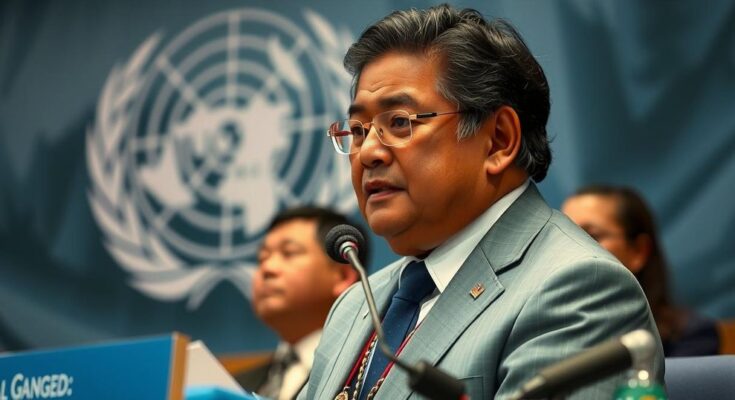Papua New Guinea’s Prime Minister, James Marape, has announced a return to UN climate talks after skipping this year’s summit, emphasizing the need for prioritizing forest conservation in climate discussions. He criticized the previous summit as unproductive and stated intentions to advocate for accountability from high carbon-emitting nations. Marape also supports Australia’s bid to co-host COP31 if forest issues are prioritized.
Papua New Guinea’s Prime Minister, James Marape, has expressed intentions to recommit to the upcoming UN climate negotiations, specifically the COP30 summit scheduled in Brazil next year. After boycotting the previous summit in Azerbaijan, which he deemed unproductive, Marape emphasized the necessity of prioritizing forest conservation in climate discussions. He criticized the lack of respect for forest stakeholders and highlighted the importance of forestry in combating climate change by absorbing carbon emissions.
With a focus on ensuring that nations with substantial carbon footprints contribute to forest conservation efforts, Marape aims to use Papua New Guinea’s significant rainforest resources—referred to as the ‘lungs of the Earth’—as a pivotal element in climate management conversations. The Prime Minister also expressed support for Australia’s bid to co-host COP31 in 2026, contingent upon a strong emphasis on forest conservation during the discussions.
Papua New Guinea, an island nation situated in the Pacific, is recognized for its rich biodiversity and expansive rainforests, which play a crucial role in the global ecosystem. The nation has faced numerous challenges related to climate change, including vulnerability to natural disasters and socioeconomic struggles heightened by environmental degradation. This context underscores the importance of Papua New Guinea’s commitment to international climate dialogues and the prioritization of sustainable forestry practices that align with global conservation efforts. The UN climate conferences, or COP summits, serve as a platform for countries to negotiate binding commitments to address climate issues, making participation essential for nations like Papua New Guinea who are significantly impacted by climate-related challenges.
In conclusion, Prime Minister James Marape’s commitment to re-engage in UN climate talks underscores the critical role of forest conservation in global climate discussions. By advocating for accountability from high carbon-emitting countries and emphasizing the ecological value of Papua New Guinea’s vast rainforest, Marape aims to elevate environmental priorities within international negotiations. His vision may significantly influence the forthcoming COP summits and further underscore the significant interplay between forest preservation and climate action.
Original Source: www.fox28spokane.com




